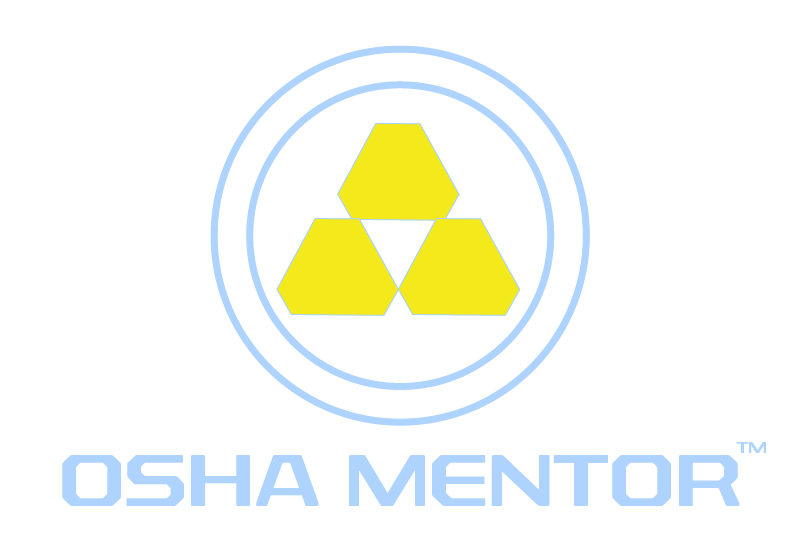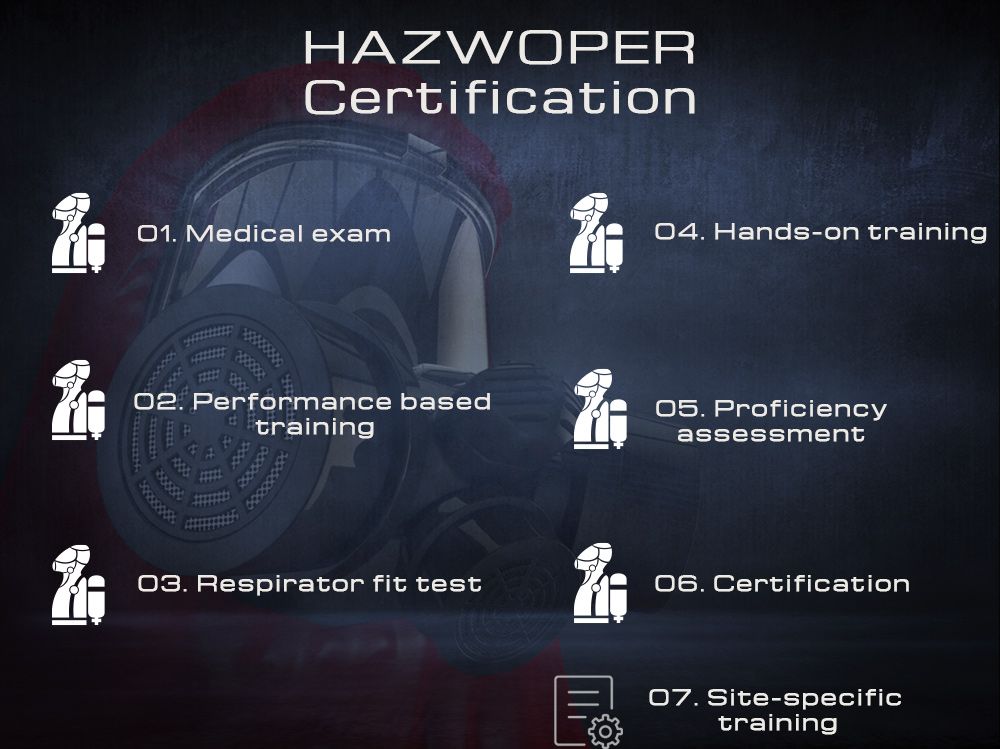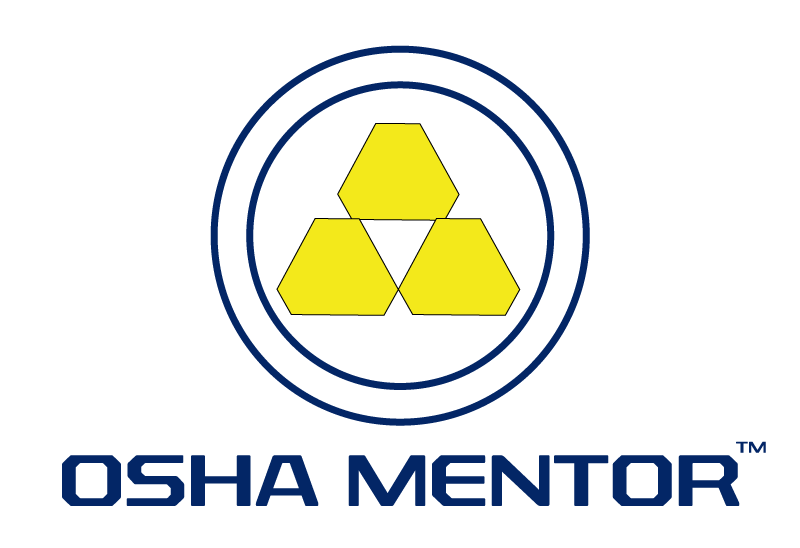
HAZWOPER Certification

The certification procedure for Hazardous Waste Operations and Emergency Response (HAZWOPER) comprises seven distinct stages. If you are employed by a company engaged in the cleanup of hazardous waste sites, undertake tasks related to the treatment, storage, or disposal of hazardous materials, or partake in emergency response operations involving hazardous substances, HAZWOPER certification is mandatory. It is crucial to prioritize the utilization of suitable Personal Protective Equipment (PPE) when operating in conditions that may pose hazards, as this is vital for minimizing the risk of potential exposure that could endanger an individual's well-being or even their life.
HAZWOPER certification requires the following seven requirements:
1. Medical exam
HAZWOPER certification requires the following seven requirements:
1. Medical exam
2. Performance based training
3. Respirator fit test
4. Hands-on training
5. Proficiency assessment
6. Certification
7. Site-specific training
Medical exam
The process of obtaining HAZWOPER certification begins with a thorough medical assessment, which includes a Pulmonary Function Test (PFT) designed to evaluate an individual's lung capacity in the context of respirator usage. During a PFT, the individual exhales into a tube connected to a volumetric cylinder to measure their lung capacity. This assessment of lung capacity is critical in ensuring an individual's capability to wear a respirator safely and perform tasks in a secure manner.
Performance based training
As part of HAZWOPER certification, employees must complete any number of training courses listed below.
General Site Workers - 29 CFR 1910.120 (e)
Emergency Response Workers - 29 CFR 1910.120 (q)
Resource Conservation and Recovery Act (RCRA) Hazardous Waste Treatment, Storage and Disposal Facilities (TSDF) - 29 CFR 1910.120 (p)
General Site Workers - 29 CFR 1910.120 (e)
• 8 hour Supervisor
Emergency Response Workers - 29 CFR 1910.120 (q)
• Hazardous Materials (HAZMAT) Technician
• HAZMAT Specialist
• HAZMAT First Responder Awareness
• HAZMAT First Responder Operations
• Incident Commander
Resource Conservation and Recovery Act (RCRA) Hazardous Waste Treatment, Storage and Disposal Facilities (TSDF) - 29 CFR 1910.120 (p)
• Hazardous Waste HAZWOPER TSDF Worker
Respirator fit test
Following the medical examination, the subsequent phase involves a respirator fit test. This testing procedure initially entails one of two types of tests:
1. A qualitative test, which depends on the participant's reaction to a test substance. For instance, common examples include the detection of smoke or the scent of banana oil.
2. A quantitative test, which gauges the concentration of a substance inside the respirator mask and compares it to the concentration of any substance(s) in the ambient atmosphere.
HAZWOPER hands on training
It has been stressed that generalized classroom or seminar-based HAZWOPER training, such as that focusing on respirators, does not meet the Occupational Safety and Health Administration (OSHA) standards. Given that a classroom environment typically accommodates students from various employers, the likelihood of the instructor possessing the exact PPE relevant to each worker's job is quite low. Consequently, it is essential for individuals to receive hands-on training with the actual equipment and PPE they will employ. This requirement cannot be met through traditional classroom instruction, online courses, simulations, or videos. Instead, employers must carry out site-specific, practical training using the actual equipment their employees will be using.
Proficiency assessment
Proficiency assessment should involve both a written evaluation and a practical skills demonstration. These assessments should gauge the knowledge and individual skills acquired during the training program. The minimum level of achievement required for proficiency must be clearly defined in written form by the instructor.
If a written test is employed, it should comprise a minimum of 50 questions. When combined with a skills demonstration, a minimum of 25 questions is required for the written portion. In cases where a skills demonstration is the sole method of assessment, the chosen tasks and criteria for successful completion must be thoroughly documented by the instructor.
The content of both the written test and skills demonstration should directly align with the course objectives. These assessment tools should be regularly updated to reflect any changes in the curriculum, with all updates subject to approval by the instructor.
If a written test is employed, it should comprise a minimum of 50 questions. When combined with a skills demonstration, a minimum of 25 questions is required for the written portion. In cases where a skills demonstration is the sole method of assessment, the chosen tasks and criteria for successful completion must be thoroughly documented by the instructor.
The content of both the written test and skills demonstration should directly align with the course objectives. These assessment tools should be regularly updated to reflect any changes in the curriculum, with all updates subject to approval by the instructor.
Certification
The instructor and employer both share the same responsibilities when certifying an individual. It is a shared responsibility but OSHA holds the employer ultimately responsible for the adequate training of their employees. The OSHA regulations are "employer-centric."
Site-specific training
As an integral component of the HAZWOPER certification process, all candidates are required to undergo either site-specific or on-the-job training. This training should be administered by a qualified instructor, and in the case of site-specific training, it should utilize the actual equipment that the employee will use in their specific role. It's crucial to understand that general equipment training alone does not meet the comprehensive compliance criteria established by OSHA. Additionally, the requirement for site-specific training must be met before an employee can begin work at a HAZWOPER site. For more in-depth information, please consult the "HAZWOPER Hands-on Training" article.
Related Articles
What is the difference between HAZWOPER 40 and HAZWOPER 24?
Does OSHA certify me to work?
HAZWOPER Job Duties and Responsibilities
What Is OSHA HAZWOPER?
HAZWOPER PPE Levels
Does OSHA certify me to work?
HAZWOPER Job Duties and Responsibilities
What is HAZWOPER Site Control?
What is a HAZMAT Suit?
What happens if my HAZWOPER certification expires?
Which HAZWOPER training do I need?
HAZWOPER Training RegulationsWhat is a HAZMAT Suit?
What happens if my HAZWOPER certification expires?
Which HAZWOPER training do I need?
What Is OSHA HAZWOPER?
HAZWOPER PPE Levels
Sources
U.S. Occupational Safety and Health Administration
https://www.osha.gov/contactus/byoffice/dep
https://www.osha.gov/sites/default/files/enforcement/directives/CPL_02-02-073.pdf
https://www.osha.gov/contactus/byoffice/dep
https://www.osha.gov/sites/default/files/enforcement/directives/CPL_02-02-073.pdf
Write your awesome label here.


